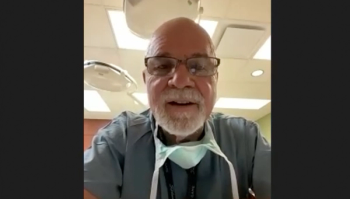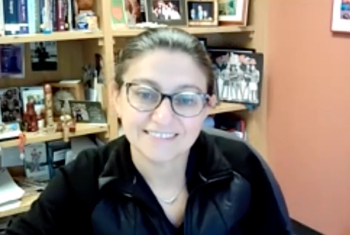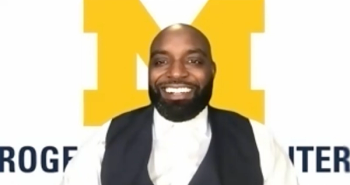
How urologists can improve transgender patient care
In a recent interview, Geolani Dy, MD, and Gaines Blasdel gave an overview of the gap in urologic care of gender diverse people and what urologists can do to make their practices more accessible to transgender patients.
The transgender and gender diverse community has been marginalized in the medical field for many years, prompting clinicians to take action to improve the care that these patients receive. Geolani Dy, MD, and Gaines Blasdel are two researchers who are passionate about getting these patients the gender-affirming care and general care they need. In a recent interview, Dy and Blasdel gave an overview of the gap in urologic care of gender diverse people and what urologists can do to make their practices more accessible to transgender patients. Dy is an Assistant Professor of Urology and Plastic and Reconstructive Surgery at Oregon Health & Science University in Portland, Oregon, who specializes in gender-affirming surgery within the OHSU Transgender Health Program. She also led the creation of Transgender and Non-Binary Surgery Allied Research Collective (TRANS-ARC), which focuses on patient-centered outcomes of genital gender-affirming surgery. Blasdel is a transgender man and gender affirming surgery outcomes researcher at NYU Langone Health in New York City, New York. He is also a TRANS-ARC Steering Committee Member.
What is the urologist's role in transgender medicine? Do you expect it to evolve over the next several years, and if so, how?
Dy: The urologist's role in transgender medicine and gender-affirming care in general can be very broad or very specific. It ranges from [the spectrum] of all the general urologic needs that might pop up, but in trans and non-binary patients, to gender-affirming surgery. [It's important to be] able to provide care in a sensitive and affirming way, whether it's for stones or gross hematuria work-up, and especially in conditions like voiding dysfunction that might be more common as a result of social norms and bathroom access and whatnot. That's one end of it—just providing affirming, general urologic care.
And then the other aspect is specifically gender-affirming surgery and genital gender-affirming surgery. Doing primary procedures, whether those are vaginoplasty, vulvoplasty, metoidioplasty, phalloplasty, anything in between, simple orchiectomy for gender affirmation, management of complications, whether surgical or from avoiding dysfunction standpoint, there is a whole range of ways in which urologists are involved in gender-affirming care.
Blasdel: I think, also, as we see an increased access to care among transgender and non-binary populations and increased coverage for a variety of procedures, we're also seeing scientific knowledge about care advance. We'll see a broadening of more urologic horizons for transgender patients, so more intricate hormone management can absolutely occur in the urologist's office and using modalities that urologists are already familiar with. In addition to gender affirming hormones, fertility care preservation [and] fertility management for transgender and non-binary populations is becoming more accessible. Just recently, here in New York state, our Medicaid program began covering some fertility treatments for people who had oncologic procedures as well as for transgender patients, so that's an expanding horizon right here in New York.
What is current state of urology and transgender medicine? How great is the need for more urologists to practice transgender medicine?
Dy: I am now starting on my third year as faculty at Oregon Health and Science University with a focus on gender-affirming surgery. But, thinking back to what things looked like when I was a resident who was interested in gender-affirming care, there are really few academic programs in the country that provided dedicated education and exposure to genital gender-affirming surgery [or] broader experience in how to meet the real needs of trans patients. And so, [from] then to now, I've seen a huge expansion in the number of academic programs that are dedicated to serving trans patients and educating the work force, but there's still a significant shortage of people who are actually providing comprehensive care and able to meet the needs of patients with a variety of baseline health conditions, mental health conditions, [and] barriers to care. So, I think, while there's been a lot of expansion, barriers still exist.
Blasdel: I would echo that I know from [the] patient and community perspective that as access has been expanding, there's still [a] limit of trained providers. I work at NYU Langone health and our waitlist is about 3 years long from when someone would call to when they could possibly have genitourinary reconstruction procedure. That's not that big of an outlier from other programs around the country. That also assumes that someone could travel here and afford to stay in New York City for several weeks while recovering from surgery. There are many states where there's no one providing primary procedures. So, there is definitely a big care gap, both in terms of capacity, but also in terms of geographic distribution and which communities have access.
What sorts of training should a urologist who wants to be involved in transgender medicine undertake?
Dy: There are certain resources that are available to anyone interested in how to provide an affirming environment, and basics of trans care. I'm just acknowledging that many of us don't receive that education in med school, or in other areas or medical training. And so, one great resource is Fenway Health out of Boston.1 They [have] a fantastic website with a lot of in-depth education modules. My colleagues and I from OHSU recently put together a piece in AUA News on how to create an affirming environment for urologic care. So, those are the basics—going over pronouns and background cultural sensitivity and competency. And then for people who are more interested in performing primary gender-affirming surgery or managing complications of gender-affirming surgery, even programs with high-volume trans care aren't going to necessarily be adequate from a residency exposure standpoint to prepare you to do this kind of surgery on your own. I do think it really requires some dedicated reconstructive urology expertise. And fortunately, a lot of the training programs that exist do have crossovers between urology and plastic surgery, which I think is really important. In addition to having a well-rounded urology residency experience, where you're gaining surgical exposure to all the different aspects of urology, I think it's really important to add on and delve into a fellowship in gender-affirming surgery, ideally, or one with reconstructive urology and some dedicated trans exposure to be able to perform procedures primarily and manage complications.
Blasdel: In addition to good technical training and a lot of hands-on exposure to a large volume of procedures, I think it's also important to educate oneself as a surgeon in the cultural experience of transgender and non-binary people and to understand how this might affect counseling and decision-making around surgery. Just as one example, not all transgender people are heterosexual in their identified gender. They might identify as lesbian, gay, bisexual, [or] queer, and have differing expectations for sex and sexuality. We may use different language for some of the same body parts or acts. And so, having a really nuanced understanding of transgender communities is helpful for providing comprehensive counseling around surgical options.
Please describe your own practice treating transgender patients; what sorts of procedures are you performing?
Dy: At OHSU as with NYU, we've got a comprehensive gender affirming surgery program. I, as a urologist, am focused on genital surgery, and so I perform vaginoplasty—creation of external vulva anatomy with an internal vaginal canal. For people who aren't interested in having a vaginal canal due to personal practices, health issues, or other preferences, I also do vulvoplasty. I also do orchiectomy, and scrotectomy, and the whole range of procedures that people born with penoscrotal anatomy might request with gender affirmation. On the other end, I also perform metoidioplasty, creation of a phallus using local genital tissue without extra flaps from other parts of the body, implant placement including testicular and erectile device placement for people who have undergone phalloplasty with donor sites from the forearm, thigh, or other parts of the body, for penoscrotal reconstruction, led by my colleagues in plastic surgery, and then of course, management of complications. My partners in urology who perform genital gender affirming surgery are Dr. Daniel Dugi, reconstructive urologist and surgical director of our Transgender Health Program, Drs. Kamran Sajadi and Jyoti Chouhan, and Drs. Jens Berli and Blair Peters, plastic surgeons.
Blasdel: I'm a health outcomes researcher at NYU Langone Health, and do patient-centered outcomes research in collaboration with Dr. Dy, as well as the surgeons here. The co-directors of our center are Plastic Surgeon Dr. Rachel Bluebond-Langner [,MD], and Reconstructive Urologist Dr. Lee Zhao, [,MD]. We perform the same spectrum of genital procedures as Dr. Dy, and additional gender affirming plastic surgery operations. From a urology perspective, Dr. Lee Zhao’s focus is on using robotic surgical platforms to perform intra-pelvic maneuvers during genital gender affirming surgery.2-3
What else should urologists know about treating transgender patients?
Blasdel: As a member of the transgender community, I [unfortunately] hear countless stories of, and have experienced myself, instances where health care providers have been unable to provide care for transgender and non-binary patients, sometimes referred to as 'transgender broken arm syndrome.' This exists on a spectrum, starting with general discomfort or awkwardness when treating transgender patients and uncertainty of how to apply sex-based general clinical principles to transgender patients. On the more extreme end, there are experiences of outright care denial, mistreatment, and other forms of trauma in the clinical setting. So, I do think that it's important to apply trauma-informed practices to working with transgender patients. Many patients have experiences like this, but I think transgender patients come in particularly with a worry about experiencing mistreatment in a clinician's office, and particularly around genitourinary care.
Dy: We're at an important crossroads right now in gender-affirming care and trans health. While there are certain states and insurers that are really expanding access to gender-affirming care and general health care for trans people, there are also other areas where basic and essential health care is at risk. And so, I think an important part of this process is thinking about how we as urologists and health care providers can continue to provide excellent care for all of our patients, including trans people, and then also really trying to study outcomes of affirming health care and gender-affirming surgery, in partnership with patients and the broader community of people who are invested in this area. Through higher-quality research in gender-affirming surgery outcomes, we can provide the evidence that's needed for payers, health care systems, and other stakeholders to really provide the coverage that's needed and the care that's needed to improve the health of this population [who's] been historically marginalized.
Blasdel: That's so important. For so long, transgender people really felt the scarcity of access and we [were] accessing care in a model that was very binary and assumed that people had a very specific set of desires—that the desired outcome was becoming “normal” or as close to cisgender (not transgender) men or women as possible. And so, outcome measurement and clinical information was gathered in that framework. As we understand that there are some transgender people do have binary or more predictable desires, there are a also wider set of different desires that people have for their treatment, different things that they value, and different decision-making processes that they have. So, I think that we're in an exciting time when trans people can be more honest with their care providers about what they're seeking, and in turn, health care providers and researchers have the opportunity to tailor care to meet the patient's true needs in that setting. Dr Dy and I have been participating in a process [called] TRANS-ARC, Transgender and Non-Binary Surgery Allied Research Collective,4 which was a PCORI-funded process that gathered stakeholders, including transgender people who had surgery, physicians, health researchers, [and] surgeons to determine what research questions are really vital to patients so we can stop assuming from a top-down lens of, "This is the outcome that's important," and instead try to flip the script and have a more emergent process of what is important to measure, and what can really inform the decision-making of patients.
References
1. Fenway Health. https://fenwayhealth.org/. Accessed December 14, 2021
2. Jun MS, Shakir NA, Blasdel G, et al. Robotic-assisted vaginectomy during staged gender-affirming penile reconstruction surgery technique and outcomes. Urology. 2021 Jun;152:74-78.doi: 10.1016/j.urology.2021.01.024. Epub 2021 Jan 23
3. Jun MS, Gonzalez E, Zhao LC, Bluebond-Langner R. Penile inversion vaginoplasty with robotically assisted peritoneal flaps. Plast Reconstr Surg. 2021 Aug 1;148(2):439-442. doi: 10.1097/PRS.0000000000008198
4. TRANS-ARC. Transgender and Non-Binary – Allied Research Collective. https://trans-arc.org/. Accessed December 14, 2021
Newsletter
Stay current with the latest urology news and practice-changing insights — sign up now for the essential updates every urologist needs.






